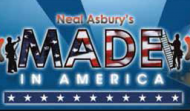
Host Neal Asbury opened his nationally syndicated “Neal Asbury’s Made in America” show on Radio America (now on 72 stations) by characterizing the passage of the net neutrality regulation as another grab by the federal government to consolidate its power—this time by taking control of the Internet.
Co-host Dr. Rich Roffman agreed, comparing it to Obamacare. “Congress passes a piece of legislation but most people voting on it haven’t the slightest idea of what’s actually in it.”
The first guest on Made in America was Republican Congressman French Hill, representing Arkansas’ second district. A banker and entrepreneur, he is adamantly opposed to Dodd-Frank.
“Community banks were designed to be the primary source for consumer and small business loans. But now all these strict regulations make such loans unprofitable and vulnerable to increasing government scrutiny. So they just stopped making loans,” related Hill.
Neal noted that HR-527 – the Small Business Regulatory Flexibility Improvements Act of 2015 – has cleared the House, which if passed by the senate, should result in greater scrutiny of ways that regulations hurt small businesses.
“For years, the Office of Management and Budget would review regulations in depth to see how they would affect people. But this review hasn’t been as tight over the years as regulations have increased,” said Hill.
Neal supported Hill’s assertion about the flow of regulations coming out of the White House, noting that while 55,000 pages of regulations were passed by the Reagan administration during both terms, under Obama, more than 100,000 pages of regulations have been passed, and his administration isn’t over yet. In 2014 alone, 75,000 pages of new regulations were distributed.
Returning to the topic of community banks, Dr. Roffman suggested that young people watching “It’s a Wonderful Life,” won’t understand that community banks were once places where the bankers knew everyone in town.
“When you put so many regulations on banks, it eats into business profits, diminishes security, while impacting banking efficiency and customer confidence. I think we will see the day when rural communities are ‘bankless,’” predicted Hill.
The discussion turned to the topic of energy, and the challenge to overcome the long-held belief that America was just an energy importing country.
“Thanks to new technologies in extracting energy, the U.S. can export enough natural gas and coal to make our country the biggest energy supplier in the world. Vetoing the Keystone XL Pipeline is a mistake since it will be the most environmentally sound pipeline every constructed. And the real tragedy is that it received bi-partisan support, which would do a lot to change perceptions that both sides of the aisle can’t work together,” noted Hill, who added that while rails do a good job transporting oil, pipelines are the safest method to transport energy.
Finally, while the show was taped before temporary funding for Homeland Security was approved, Hill maintained that the bill initially totally funded Homeland Security, but Democrats were unwilling to remove approval for Obama’s executive order to circumvent immigration policy.
James Gattuso, a Senior Research Fellow in Regulatory Policy at The Heritage Foundation, was the next guest on Made in America to continue the discussion on “net neutrality.”
“By passing the Net Neutrality regulation, it creates a level playing field for both large and small companies doing commerce on the Internet. In particular, it addresses the domination of the Internet controlled by content giants such as Amazon, EBay and Netflix. It creates an equal level of pricing,” said Gattuso.
Gattuso notes that the regulations aren’t initially about content — it’s about economic regulation. It gives the FCC more power and allows them to impose regulations on the Internet since it will be treated as a utility. The danger is that the potential for FCC abuse is big,” according to Gattuso.
The final guest on Made in America was Greg W. Mourad, VP of the National Right to Work Committee, who expressed his support for Wisconsin, which is in line to become the latest Right to Work state.
Neal remarked that it is ironic that the State of Wisconsin, long associated with the rise in unions, is now being associated with turning its back on unions by becoming a Right to Work state.
“It’s another indication that unions are unpopular everywhere. Being a Right to Work state is good for worker freedom, and good for state politics. Since Republicans control both the Senate and House in Wisconsin, there’s a 90-95 percent chance that the bill will pass, since Governor Scott Walker indicated he will sign the bill,” proposed Mourad.
Mourad predicted that Wisconsin is just one of a number of states that will become Right to Work states. Others states in line are Missouri, Kentucky, Montana, Maine, New Hampshire, and possibly Colorado.
Neal concluded the discussion by wondering what the NLRB would look like if Scott Walker becomes President.
As part of his ongoing segment on the rise in the development of robots to replace human workers, Dr. Roffman noted that Pinnacle Health is working on freeing physicians from making bedside visits by using remotely operated robots as their stand- in.
Elsewhere in healthcare, nanoparticle technology will inject microscopic “drones” into the blood stream to repair blood clots and other irregularities in the system.
Finally, with a nod to Frankenstein, an Italian surgeon believes that in two years, he will be able to transplant a person’s head onto a healthier body.
On the cronyism front, Hillary and Bill Clinton are essentially living mortgage-free on an $11 million estate. Dr. Roffman notes that the Clintons have a $10,000 a month mortgage. But since the secret service must live on their property, they are leasing land to the Secret Service for the convenient price of $10,000 per month – their mortgage. “So the American taxpayer is paying the Clinton mortgage. Next time you’re in their neck of the woods, stop by to see how your money is doing,” proposed Dr. Roffman.
Each week Neal Asbury’ Made in America provides Neal’s insights into the week’s top news stories and their impact on the worlds of entrepreneurship, small business ownership and the overall economy. Neal’s analysis, together with co-host Dr. Richard Roffman, a veteran 30-year publisher with extensive domestic and international experience, takes a non-biased approach based on real life experience in business as an American manufacturer and exporter. Made in America airs nationally each Saturday from 7-8:00 PM on Radio America. Link to Made in America at http://www.nealasburysmadeinamerica.com
FEB



